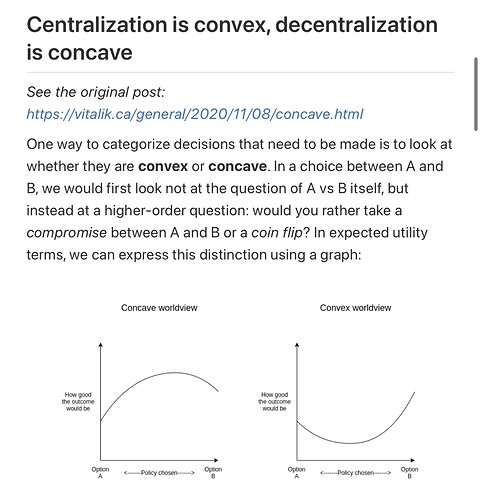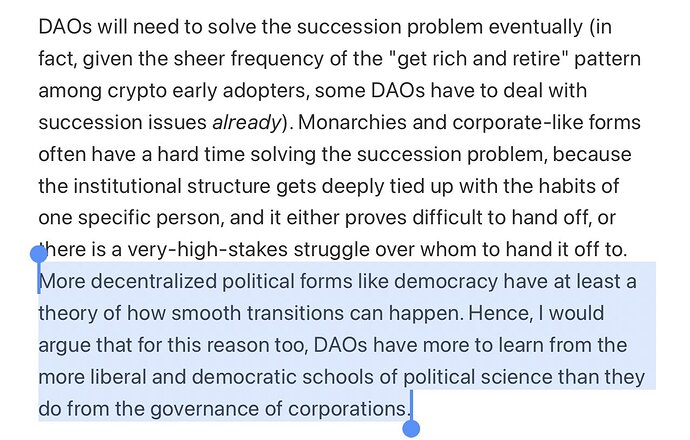HIP: 69
title: The Proof of Humanity Constitution
authors: @shotaro, @greenlucid
status: Phase 1
created: 2022-09-19
conflicts with: None
languages: EN
Simple Summary
Establish the Proof of Humanity Constitution.
Abstract
Proof of Humanity was born as a 1p1v DAO without any guiding principles or common framework. Proof of Humanity governance is maturing and we recognize that we need a guiding constitution. The Proof of Humanity Constitution is intended to establish a minimal functioning set of rules and principles,
- Principle of Non-Discrimination
- Principle of 1p1v
- Principle of Wide Pluralistic Consensus
- Principle of Sybil Resistance
Motivation
Proof of Humanity survived many governance struggles this year, including proposals which would ineffect break the sybil resistance of the protocol. These governance struggles are not a recent problem either.
I highly recommend you watch Jimmy Ragosa’s talk motivating a need for a constitution for Proof of Humanity. If you do not click now, please come back to the link after reading the proposal.
Observe that many of the protocol orientied HIPs (below) historically pass with a large consensus.
- HIP28: Update submissionBaseDeposit 99%
- HIP45: Markdown policy, 100%
- HIP36: Registration Validitity extension 99%
- HIP37: EPNS delegate 99%
- HIP30: PoH Governor Deposit Update 100%
While lots of the politically motivated HIPs were passed or failed with a slim margin.
- HIP50: Official Social Media Groups 60%
- HIP-49: Change of Arbitrator 48%
- HIP 48 - Removal of Clement Lesaege 39%
Proof of Humanity like other DAOs suffers low participation rates. Typical voter turnout with delegations on is in the ~800 range, with only around ~100 users signing messages out of a total of 16,000+ registered humans.
Last year when POH launched I proposed quorums as a minimum voter participation rate to pass HIPs. I am now convinced one year later that quorums are not a good solution since this would result in deadlock.
Instead, in the interests of promoting a wide consensus amongst a wide plurality of voices, a higher voting threshold is proposed which will require a wide consensus amongst a plurality of different PoH members.
Specification
Specify the Proof of Humanity Constitution as governance rules by amending the Proof of Humanity Governor Primary Policy and specifying the amended document with the function,
function changeMetaEvidence(string _metaEvidence) public onlyByGovernor
on the POH Governor contract 0x327a29fcE0a6490E4236240Be176dAA282EcCfdF
Rationale
- Principle of Non-Discrimination
As discussed in HIP-11 and HIP-19 about guiding principles and guidelines, Proof of Humanity commits to the principle of non-discrimination. Proof of Humanity is an open, permissionless protocol for all humans making no distinction of gender, sexual orientation, disability, ethnicity, religion, or age.
- Principle of 1p1v
Accordingly, with the principle of equality above, Proof of Humanity also commits to the principle of 1 human 1 vote either voting directly or by delegation.
- Principle of Wide Pluralistic Consensus
A minimum threshold of 3/4 is required to pass proposals.
This ensures that a vocal minority (1/4) can essentially veto HIPs while ensuring that a consensus amongst a wide plurality of POH members must be reached inorder to pass HIPs. Ideally we can avoid a polarity in governance where sides are split 60/40, but where we need to cooperate and achieve a large consensus to improve POH.
- Principle of Sybil Resistance
In light of HIP-49 which nearly broke the sybil resistance of the protocol by changing the arbitrator to a non-functional arbitrator, we require that all HIPs which clearly and demonstrably break the sybil resistance of the protocol be forbidden.

 No technological improvement to the protocol has been stalled by our DAO.
No technological improvement to the protocol has been stalled by our DAO. 
 on. It’s really a shame to see people thinking in this direction.
on. It’s really a shame to see people thinking in this direction.